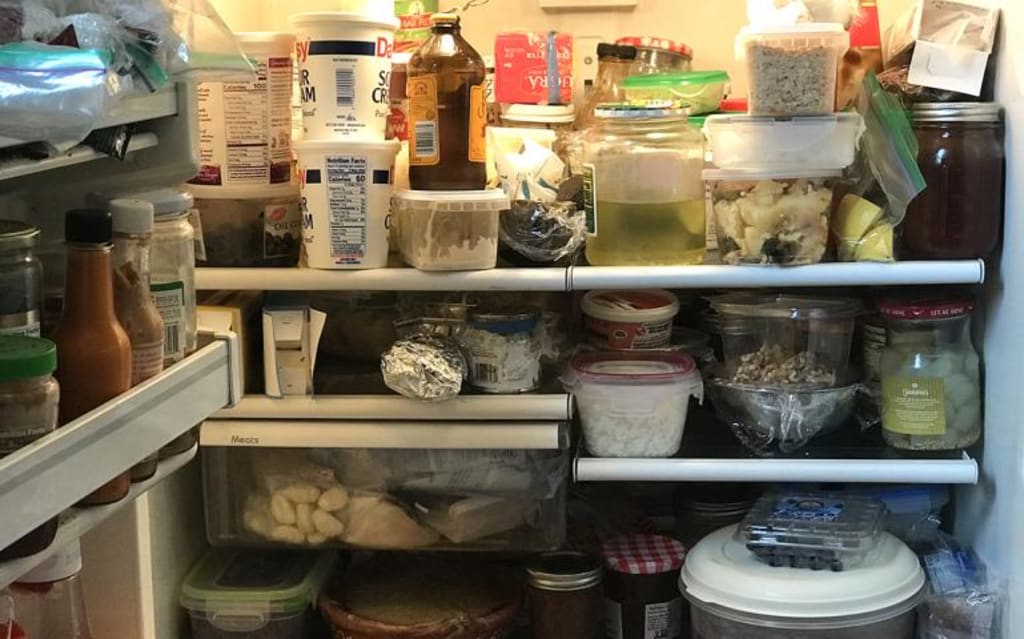Occam’s Refrigerator
A 14th-century solution to preventing post-holiday food waste

You may peer into your groaning, overstuffed, post-holiday refrigerator and see only a chaos of forgotten entrees, mystery sauces, half-completed baking projects, and well-intentioned gifts from guests, all on top of the usual flotsam and jetsam of everyday food storage. But, in fact, that caloric mountain represents a golden opportunity to use up the old and—eventually—make room for the new: a more orderly and less wasteful 2022.
There weren’t refrigerators in the day of 14th-century philosopher William of Occam (the Little Ice Age would have kept things chilly enough). But if there were, ol’ Bill would have known how to clean one out—by applying “Occam’s Razor,” of course, his eponymous principle that cautions against “needless multiplication of entities.” Thus, a simple and elegant mathematical proof would be prized over a complicated one.
And what is an early-January fridge but a catastrophic multiplication of entities? For example, I learned over the holiday how to make J. Kenji López-Alt’s miraculous two-minute mayonnaise, and I now have containers of plain mayo, aioli, harissa mayonnaise, and other varieties I can no longer identify. If you want a more home-grown philosophical principle than Occam’s, you can follow Henry David Thoreau: Simplify, simplify, simplify!
So your first slice of the razor would be to avoid those entities; in other words, stop buying food (we’ll make exceptions for staples). What are we trying to avoid? Needless multiplication of entities! What does that entail? Shop first in your own refrigerator!
This may require a more flexible attitude to what constitutes a meal than you may be accustomed to. I’m not just talking about reheating that container of Chinese takeout rice instead of boiling potatoes for a carbo base (although that would be an excellent idea). Many food-secure people are in the habit of eating something new each day, but we’re calling a halt to that until you can see the back of your fridge. No new ingredients unless they’re necessary to finish off something else. Since we’re all about reducing food waste, at the top of the menu-planning list go the highly perishables. That leftover pasta won’t suffer by another couple days of aging, but you’d best move that fish along right away. (Chowder is the classic mechanism for dealing with fishy remains; it’s easy and delicious. Try it with leftover salmon.) If you feel the need for novelty, you can dress things up: The sautéed asparagus can make another turn as a soup, and most anything can fill up an omelet. Or a taco. Or a stir fry. What are we trying to avoid? Needless multiplication of entities! What does that entail? Shop first in your own refrigerator!After you’ve got the perishables out of the way, turn your attention to the big items. (You know what to do with the turkey carcass, right?) It’s satisfying to be able to see some progress, and you might be able to make an entire meal out of a single item. Ideally, you’ll be able to use up all of an ingredient in one go, since we’re trying to winnow away the sheer number of items. You can establish a point system: One entity, one point. Lunchtime sandwich that uses up the aioli, roast fennel, and spinach? Three points!
If you are of a competitive nature, you can gamify your food-storage disorder further by using social media to challenge your friends to a refrigerator-clearance contest. We did one several years ago that we called the Freezer Games (riffing on the then-popular Hunger Games franchise). The rules were fluid, and the game consisted largely of boasting about how many leftovers one had managed to combine into a single dish, but it did the trick.
For a different approach to holiday cleanup, see Mark Bittman’s Substack Bittman Project: “Everyone has different stuff in their fridge and freezer. So we hope to inspire a new approach to leftovers, starting today.” Bittman divides his leftovers into seven categories (things you can eat cold, things you have to reheat, etc.), which one might consider a needless multiplication. But if it cleans out the fridge, who’s to complain?






Comments
There are no comments for this story
Be the first to respond and start the conversation.